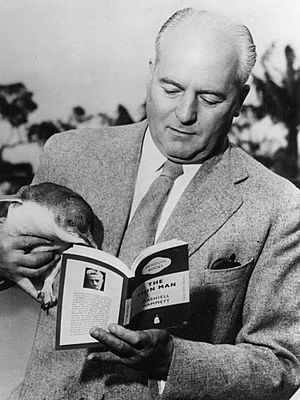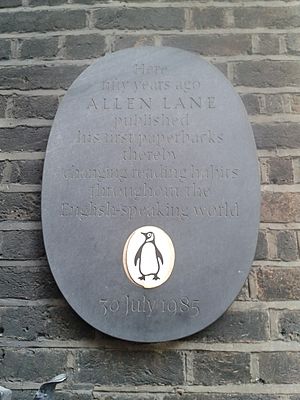Allen Lane facts for kids
Quick facts for kids
Sir Allen Lane
|
|
|---|---|

Photo of Penguin founder Sir Allen Lane, London Zoo. Source: Lane Family.
|
|
| Born |
Allen Lane Williams
21 September 1902 Bristol, England, United Kingdom
|
| Died | 7 July 1970 (aged 67) Northwood, Middlesex, England, United Kingdom
|
| Burial place | St Nectan's Church, Hartland |
| Nationality | British |
| Occupation | Publisher |
| Known for | Founder of Penguin Books |
| Spouse(s) | Lady Letitia Lucy Lane (1941–1970) |
| Children |
|
| Relatives | John Lane (uncle) |
| Awards |
|

Sir Allen Lane CH (born Allen Lane Williams; 21 September 1902 – 7 July 1970) was a British publisher. He is famous for starting Penguin Books in 1935 with his brothers Richard and John. Their goal was to make good quality paperback books available to everyone.
In 1967, he also started a company for hardback books called Allen Lane.
Contents
Early Life
Allen Lane Williams was born in Bristol, England. He went to Bristol Grammar School. In 1919, he joined a publishing company called Bodley Head. He became an apprentice to his uncle, John Lane, who founded the company.
To keep the company in the family, Allen and his relatives changed their last name to Lane. Allen Lane married Lettice Lucy Orr on 28 June 1941. They had three daughters: Clare, Christine, and Anna. He was made a knight in 1952.
Starting Penguin Books
Allen Lane quickly moved up at Bodley Head. By 1925, he was the managing editor after his uncle passed away. He had some disagreements with the company's leaders. They were worried about publishing certain challenging books.
Because of these disagreements, Lane and his brothers, Richard and John, started Penguin Books in 1935. At first, it was part of Bodley Head.
A New Idea for Books
Penguin Books became its own company the next year. A popular story says that in 1934, Lane was on a train trip. He realized there were no good books to buy at the station. This gave him an idea.
He imagined selling paperback books that were good quality but also very cheap. They would even be sold from a vending machine! The first one was called the "Penguincubator." Lane also learned from another publisher, Albatross Books, and used some of their new ideas.
Most booksellers and authors didn't like the idea of paperbacks. They thought people would spend less money on books. But Lane was very determined. He trusted his instincts and imagination. He loved solving big problems.
Lane was a creative genius. Once he had an idea, he worked hard until it happened. He decided what the books should look like and what to name them. He also needed to get permission from other publishers to print their books in paperback. He once said, "I have never been able to understand why cheap books should not also be well designed, for good design is no more expensive than bad."
Designing the Look
Edward Young designed the famous horizontal bands on the Penguin covers. He used a font called Gill Sans Bold for the titles. He even went to the Zoo in Regents Park to draw penguins for the cover. Allen Lane wanted a design that was easy to spot and always the same. In 1937, the font was changed to Times New Roman.
Lane also created other book series:
- Pelican Books were for non-fiction, meant to teach people.
- Penguin Books were meant to entertain.
By the 1950s, Penguin Books had grown very large. It had major offices in Australia and the United States. Lane's way of managing sometimes caused problems with the leaders in the U.S. office. These leaders eventually left Penguin and started their own publishing companies.
Important Publications
The paperback idea was a huge success. Lane expanded into other areas:
- Pelican Books in 1937
- Puffin Books (for children) in 1940
- The Penguin Classics series in 1945
Lane made the important decision to publish a special edition of D. H. Lawrence's book Lady Chatterley's Lover. This was done to test a new law about publishing freedom.
In 1965, there was a disagreement with the chief editor, Tony Godwin. Lane had a strong reaction to a book by cartoonist Siné. He took action to prevent its publication.
Lane removed Godwin from his position and kept control of Penguin. However, he had to retire soon after due to illness. He passed away in 1970 in Northwood, Middlesex.
See Also
- Penguin Books

